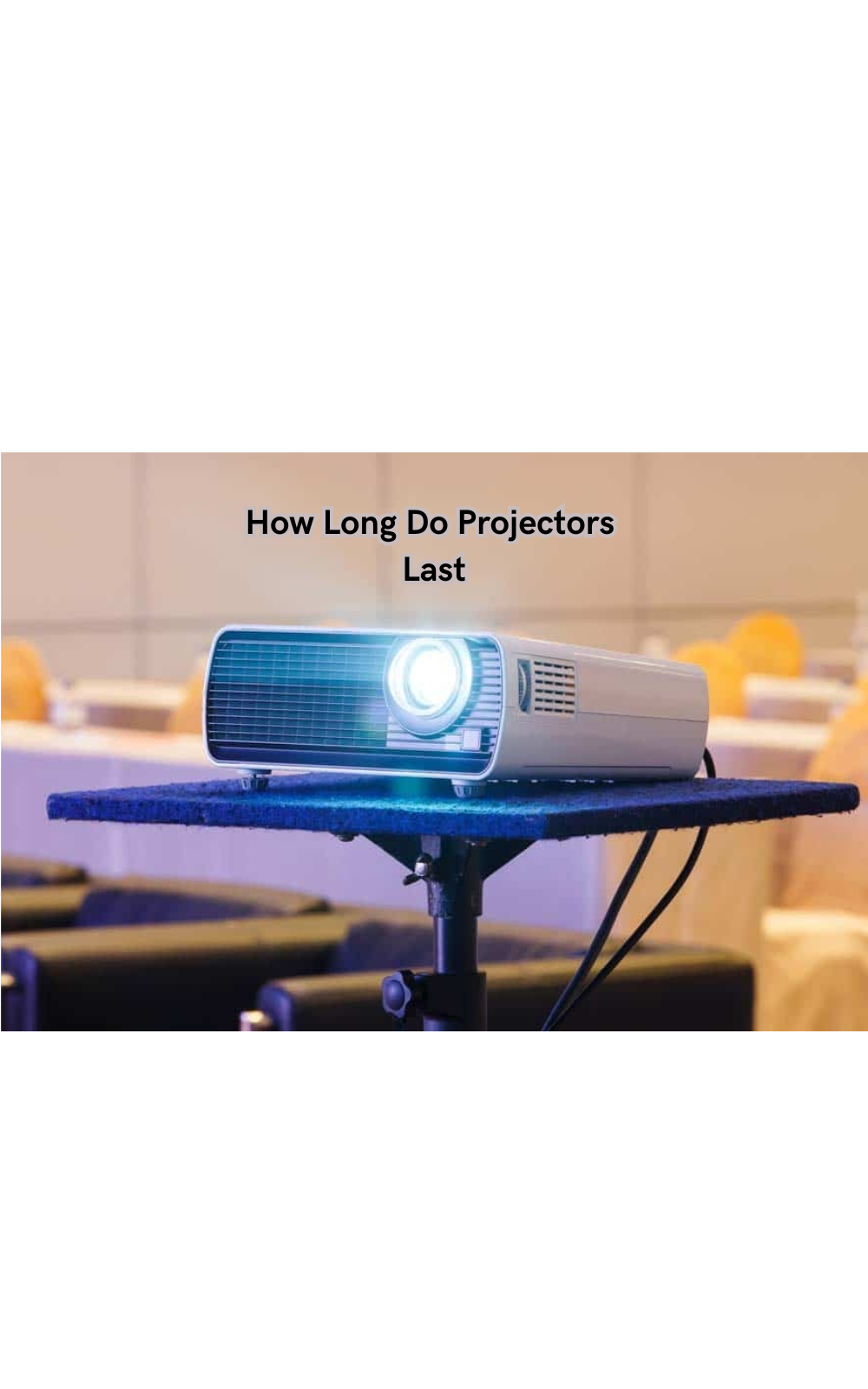How Long Do Projectors Last
This exploration into the factors affecting projector longevity helps consumers choose the right equipment, ensuring they benefit from optimal performance and value over time.

In today's rapidly evolving projection technology world, understanding how long projectors last is crucial for making informed purchasing decisions. A projector's lifespan is significantly influenced by its light source, including traditional projector lamps, advanced laser light sources, and modern projector bulbs.
Technological advancements have continually enhanced projection systems, improving efficiency and durability. A projector's lifespan can vary widely depending on the type of light source utilized, with laser light sources offering longer-lasting performance compared to conventional projector lamps.
This exploration into the factors affecting projector longevity helps consumers choose the right equipment, ensuring they benefit from optimal performance and value over time.
Types of Projectors and Their Average Lifespans
Projectors have come a long way since they first entered the market. Today, several projectors are available, each with unique features and capabilities. Each type also has an average lifespan, depending on the light source used and other factors, such as usage patterns.
LED Projectors:
These projectors use LED bulbs as their light source, which boasts an incredibly long life expectancy of up to 20,000 hours. This makes them highly durable and cost-effective in the long run. Additionally, LED bulbs provide excellent image quality and consume less power than traditional lamps.
Lamp-Based Projectors:
These are the most common projectors that use a projector lamp or bulb as their light source. Depending on the brand and usage patterns, the average projector lamp life can range from 2,000 to 5,000 hours. Regular maintenance and bulb replacement are essential for maintaining optimal performance.
Laser Projectors:
Laser projectors utilize advanced laser light sources that offer significantly longer lifespans of up to 50,000 hours. They also provide superior image quality and color accuracy, making them popular for high-end home theaters and professional settings.
Hybrid Projectors:
These projectors combine traditional lamps and modern laser technology to create a hybrid light source. This allows for improved energy efficiency and extended lifespan compared to lamp-based projectors.
How Long Do Projectors Last
Several factors can affect the lifespan of a projector, and it's essential to understand them to ensure your projector lasts as long as possible. Here are some of the key factors that influence the longevity of a projector:
Usage Frequency:
One of the most significant factors determining how long a projector lasts is its usage frequency. A projector that is used regularly for professional presentations and events will have a shorter lifespan than one occasionally used in a home theatre setup.
Continuous use puts more strain on the internal components, causing them to wear out faster. Taking breaks between uses is recommended to allow the projector to cool down and extend its lifespan.
Maintenance:
Proper maintenance is crucial for ensuring your projector lasts as long as possible. This includes regular cleaning of air filters, which can become clogged with dust and debris over time, leading to overheating and potential damage.
Additionally, it's essential to replace the projector bulb or laser light source when it reaches the end of its lifespan. Neglecting to do so can result in a significant drop in image quality and potentially damage the internal components of the projector.
Environmental Factors:
The environment in which a projector is used can also impact its lifespan. High humidity, extreme temperatures, and excessive dust can all affect the internal components and reduce their longevity. It's important to keep your projector in a well-ventilated area with moderate temperature and humidity levels to ensure optimal performance.
Lamps:
The type and quality of the lamp used in a projector can also have a significant impact on its lifespan. Cheap, low-quality lamps may not last as long as higher-end, branded lamps, resulting in more frequent replacements and potential damage to the projector. LED lamps and laser light sources are generally more durable and long-lasting than traditional projector lamps.
Quality of Projector Components:
The overall quality of a projector's components plays a vital role in determining how long it will last. A high-quality projector with durable internal components is likely to have a longer lifespan compared to a cheaper, lower quality option. It's worth investing in a reputable brand and model to ensure your projector lasts for several years.
Proper Usage:
How you use your projector can also affect its lifespan significantly. For example, turning off the projector correctly and allowing it to cool down before moving or storing it can prevent damage to internal components. Additionally, avoiding sudden power outages or surges can protect the sensitive electronics inside the projector.
Average life expectancy is essential for consumers to consider when purchasing a projector. If projector running costs are a concern, it's essential to choose a model with an efficient light source and take proper care of the device. Additionally, understanding the factors that can affect a projector's lifespan can help users maximize their investment and enjoy high-quality projection for years to come.
Maintenance Tips to Extend Lifespan
Here are some simple maintenance tips to extend the lifespan of your projector:
Regular Cleaning: As mentioned earlier, regularly cleaning the air filters and other external components of your projector can prevent dust buildup, which can affect its performance and longevity. Use a soft cloth or brush to gently remove any dirt or debris.
Proper Storage: When not in use, store your projector in a cool, dry place with moderate humidity levels. Avoid placing it in direct sunlight or near sources of heat.
Bulb Replacement: Replace projector bulbs or laser light sources when they reach their end-of-life. Neglecting to do so can result in a significant drop in image quality and potentially damage the internal components of the projector.
Professional Maintenance: If you notice any issues with your projector, it's best to have it inspected and serviced by a professional. They can identify and fix any potential problems, ensuring your projector continues to function properly.
By following these maintenance tips, you can help extend the lifespan of your projector and enjoy high-quality projection for years to come. A laser projector, for example, can last up to 25 years with proper care and maintenance. It's worth investing the time and effort into caring for your projector to maximize its lifespan.
Signs That a Projector Needs Replacement
Now that we've discussed the lifespan of projectors and how to extend it, let's look at some signs that indicate it may be time to replace your projector. Here are some common indicators that your projector needs replacement:
- Frequent Bulb Replacement: If you frequently have to replace your projector bulb or laser light source, it could be a sign that your projector is reaching the end of its lifespan. Consider investing in a more durable and long-lasting model.
- Dimming or Flickering Image: As projectors age, their image quality can deteriorate. If you notice dimming or flickering in your projected image, it could be due to wear and tear on the internal components of your projector.
- Loud or Unusual Noises: Any unusual noises from your projector, such as buzzing or grinding sounds, could indicate a problem with its internal components. It's best to have it inspected by a professional and consider replacing it if necessary.
- Overheating or Shutdowns: If your projector constantly overheats or shuts down unexpectedly, this could be a sign that its components are wearing out. It's important to address these issues promptly to prevent further damage and potentially consider purchasing a new projector.
Each projector will have a different lifespan depending on usage frequency, maintenance, and environmental factors.
Do Projectors Last Longer than TVs?
Many factors can affect the lifespan of a projector or TV. However, on average, projectors tend to last longer than TVs.
Projectors have fewer internal components that can wear out over time. Additionally, projectors are often used less frequently and in more controlled environments than TVs.
However, it's essential to note that projectors and TVs can have varying lifespans depending on usage and maintenance. Regular cleaning and proper care can significantly extend the lifespan of both devices.
Moreover, technological advancement may also affect their longevity, as newer models often have more advanced features and components that can increase their lifespan. Ultimately, it's important to consider each device's specific usage and care when determining how long they will last.
FAQs
Do projectors degrade over time?
Yes, projectors can degrade over time due to wear and tear on internal components. Regular maintenance and proper usage can help extend their lifespan.
How often should projector bulbs be replaced?
Projector bulbs or laser light sources should typically be replaced every 2,000-4,000 hours of use. However, some models may have longer-lasting bulbs that can last up to 10,000 hours.
Can projectors be repaired?
In most cases, projectors can be repaired by a professional if necessary. It's important to address any issues promptly to prevent further damage and increase the chances of successful repair.
Are expensive projectors worth it?
High-quality, more expensive projectors often have more advanced features and longer lifespans, making them a worthwhile investment for those who frequently use them. However, it's important to consider your specific needs and usage when determining the value of a projector.
Conclusion
Understanding the lifespan of projectors is vital for making informed purchasing decisions, as it directly impacts long-term satisfaction and value.
Throughout this exploration, we've examined how different light sources, such as laser light sources, projector lamps, and projector bulbs, influence longevity. Technological advancements have significantly enhanced projector durability, making them more reliable than ever.
Regular maintenance and careful consideration of usage patterns can further extend a projector's life, ensuring optimal performance.
As consumers navigate the evolving landscape of projection technology, staying informed about the latest innovations is crucial. By aligning projector choices with individual needs and technological developments, users can maximize their investments and enjoy superior viewing experiences.
